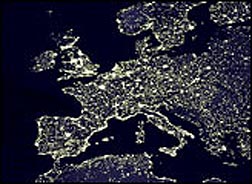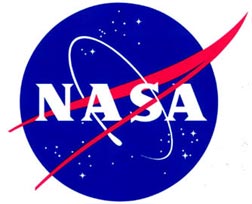July 10,2006 The Big Blue Marble
| I just passed a local site today: the "most awesome flea-market in the world" and another sign touting world famous awesome Bar-B- Que. My friend Larry sent this: it was edifying and TRULY awe inspiring. We need a dose of real awe every once in a while to get a bit of perspective. I sometimes miss my days at the beginning of my career of working as a planetarium artist... |  |
 |
The site is a glorious one by NASA. By permission, here's Larry's off- the- cuff commentary..."To me, the most eye-opening thing was the great difference between South and North Korea. There, one picture says much more than 1000 words -- the great dark void between South Korea and mainland China. And yet, we should have known it all along. South Korea almost looks like an island off the coast of China." |
"First, this is one of these
views that can be made large or small. Most of these comments are made
from large viewing -- but they apply either way."
"Notice particularly, that you can see the outline of the continents
barely, where the lights aren't -- thus you can see all of Canada if
you look closely."
"How the islands that ring the Caribbean are so well lit. And the
difference in lighting between Cuba and little Puerto Rico to Cuba's
east -- and while in the area, note the Florida Keys."
"Note how the South American countries that are in financial darkness
are also in literal darkness -- Colombia, Bolivia, and Peru, and inner
Brazil."
"!! And in that vein, and timely, the difference between North
and South Korea, just west of Japan. The "diamond" at the
top of South Korea, right near the darkened DMZ is Seoul."
"And Japan itself may have the greatest concentration of lights
per square mile of any country. "
"And SSW of Japan, the little island of Taiwan, with a great concentration
of lights facing toward China."
"And paging down, the great unlit central and western lands of
Australia.
And paging left/west, Africa -- the upper half showing the unlit Sahara
desert; but in the bottom half, the unlit middle is the Congo -- in
darkness in almost every way."
"And the peculiar lights around the Nile River in Egypt -- almost
like spotlights -- the only river so delineated."
"And while China has large unlit areas, India has lights all over
(very highly defined). And to the Northwest of India, the big unlit
void of Afghanistan. And NNE of India , unlit Tibet.
"And how well defined the Mediterranean is, and how well lit the
boot of Italy and Sicily are compared to Greece just to the east."
In His Presence
Through the gates of splendor we pass
We go the way of all flesh and all grass
While the ancient doors are open wide
To invite the beloved inside.
Through the gates of heaven rides the glorious King
He sits in majesty enthroned and rules o’er everything.
To enter these gates will be our goal
To dwell in his presence where we are made whole.
Where we will receive our inheritance
At a celebration where we’ll sing and we’ll dance.
In His presence there is unity
In His presence there is peace
In His presence we will forever remain
We will never seek a release.
For in His presence there is beauty
In His presence there is rest
The joy and the purpose for which all men loing
In His presence where His name is confessed
And He is forever blessed.
In His presence there is mercy
Restoration and comfort complete
Where the hungry and the thirsty
Eat a banquet there at His feet
As we fall before the mercy seat.
Anthony Foster
July 7, 2006
Thinking critically...
Critical thinking is the active pursuit in the life of the mind to establish
a coherent, unified process of looking at and interpreting reality in
the light of what is right and true. As rational, moral., creative,
and aesthetic creatures who are created in the image Dei, critical thinking
is not an option.
Colossians 3:9-10 tells us to "put on the new man, which is being
renewed in knowledge after the image (ikon) of its creator." Paul
tells us to "Critically examine EVERYTHING. Hold on to the good."
(1 Thessalonians 5.21). 2 Corinthians 10:5 says we are to "take
every thought captive in obedience to Christ."
Critical thinking is a virtue, and is related spiritually to discernment.
Indeed, I would say that for the Christian, critical thinking is a form
of righteousness, since it is set about the business of exacting what
is right, true, good, and beautiful. That would infer that the lack
of critical thinking is a form of sin. Critical thinking will likely
involve the deconstruction of one's presuppositions and assumptions.
Critical thinking is active thinking- it is curious and skeptical, and
forms a lens through which by the power of the Holy spirit, we can be
led into all the Truth.
Critical thinking pursues the reconstitution of the perception of truth
that was fragmented by the fall. It is an aspect of renewing our minds
(Romans 12:2). This process has taken me early on through the reading
and of books on logic, and the practice of logical argumentation where
the goal was to destroy your opponents arguments and quote the Bible
doing it. As an artist the process of critique was the way by which
one improved one's abilities aesthetically and ideologically. I learned
not to be precious with my work or identify with it in a selfish way.
Later as I grew up, I learned that critical inquiry is an act of humility,
wherein one comes to understand it is by the grace of God we know anything
objectively. Francis Schaeffer, Carl Henry, C. S. Lewis, and the gift
of several fine pastors who loved me enough to help me see this reformed
my view of reality. Perhaps the greatest benefit of critical thinking
is in understanding that from the perspective of the cross, which is
foolishness to the wise, failure becomes a theological construct.
As a college teacher, I have endeavored to instruct my students especially
in the critical evaluation of information, creative critique, and in
the difference between original and derivative thought.
Thinking about thinking
It has occurred to me that in my life, critical thinking has been exacted
in relational dialogue (It also occurred that I need to spell check).
First, with my "Great Knocks" who have challenged my presuppositions:
my wife, who has the gift of discernment, and who came from a non-churched
background has helped me burn the dross of churchianity out of my life
as I have discipled her. My best friend, Larry Gott, who is a PCA teaching
elder (he's been the co-teacher of Sinclair Ferguson's SS class for
the past couple of years) is great at Socratic questioning; our email
conversation has extended for nigh on ten years now.
Miss Dorothy, my childhood Sunday school teacher who taught me that
scripture memorization and asking "what does the Bible say?"
is to be a part of daily life; My former pastor, Duane Litfin taught
me that Biblical theology is the only theology I should ultimately make
my stand on and that the proper handling of the scriptures is prerequisite;
my co-members at a couple of great Bible churches in Dallas who were
DTS professors - sustained and challenged me during a "sand seminary"
Midian experience; Jerram Barrs, who modelled a keen mind and a meek
and humble heart.
Dialogue of another kind can come from reading. First of all, reading
authors with whom you do not agree and even reading syncretistic or
proponents of fallen ideas, such as Paulo Friere and Jonathan Kozol,
Heidegger and Hegel and Kant, Tillich. If we read cheaply, we will likely
think cheaply.
At the opposite extreme, in addition to the authors I previously mentioned,
I awoke this morning thinking of the contribution to my thought life
made by Garry Friesen, Jonathan Edwards, J. I. Packer, Cal Seerveld,
and so many others I have never met in person this side of heaven. Every
so often I track down and write a letter of appreciation to individuals
who have been Samaritans on the cognitive journey. I have a lot of those
to write in heaven.
No Neutral Assumptions
We all have an ontological set that helps us make sense of the world.
In regard to critical thinking, it is necessary for us to determine
what those basic presumptions are. This is especially critical for leaders
since we will be challenged at this nexus from within and without the
church.
From within the church, we see a shift from belief in absolutes to relativism.
In the emergent church, especially, the very leaders are buying the
postmodern construct that you cannot reason with people about faith,
and apologetics is an endangered species in these circles. We are told
that "knowledge puffeth up" and anti-intellectualism is taking
on a new tenor: anti-rationalism.
Apologetics is only one area where this is important. We should know
our own presuppositions and why they are necessary, such as the assumption
of the truth of supernatural revelation, cause and effect, the law of
non-contradiction, the reality of absolute truth. Foucault denied the
reality of any of these, partly based on the failed promises of modernism.
We assert them based on the faithful and true promises of God. Our opponents
will declare that the world makes sense from their naturalistic presuppositions
or deny the possibility of making sense in an absurd world. But most
of them will still get up and go to work tomorrow as if it does.
We will be challenged to show them why their belief systems are not
in keeping with reality, or where their presuppositions do not cohere.
We are up against an anti- logical, absurdist generation, but God is
the God of lost causes. Logical proofs are important but we cannot stop
there, as logic itself is based in the rational-personal aspect of the
image of the God of Truth. It is because of this, in relation with the
convicting power of Word and Spirit, that in a world of competing worldviews
that the Christian worldview is absolutely superior.
Jesus Loves the Little Varmints
Jesus loves the little varmints
All the varmints of the world
Though our sin is black as night
We are precious in His sight
Jesus loves the little varmints of the world
Jesus loves the little varmints
All the varmints of the world
He will cleanse and make us right
Then we’ll walk within the light
Jesus loves the little varmints of the world.
Anthony Foster
July 10, 2006
You are Awesome, God
You are awesome, God- you deliver the weak
You are awesome, God-so your glory we will seek
You are awesome, God-as you turn our loss to gain
You are awesome, God- and forever you shall reign
Awesome God!
We stand in awe in your presence
We tremble and fall on our face
We give you all glory and reverence
In awe at your amazing grace.
You are awesome, God- for lost sinners you restore
You are awesome, God- We your holiness adore
You are awesome, God-Sonow we declare your fame
You are awesome, God-praise the name above all names
Awesome God!
You are awesome, God-you created all the earth
You are awesome, God-We’ll not measure all you’re worth
You are awesome, God- For you spoke and there was light
You are awesome, God-you alone will make us right.
Awesome God!
We stand in awe in your holy presence
On your name we call as on our knees we bow.
We give you all glory and reverence
We worship for you have saved us now.
Awesome God!
Awesome God!
Awesome God!
Awesome God!
Anthony Foster
July 10, 2006